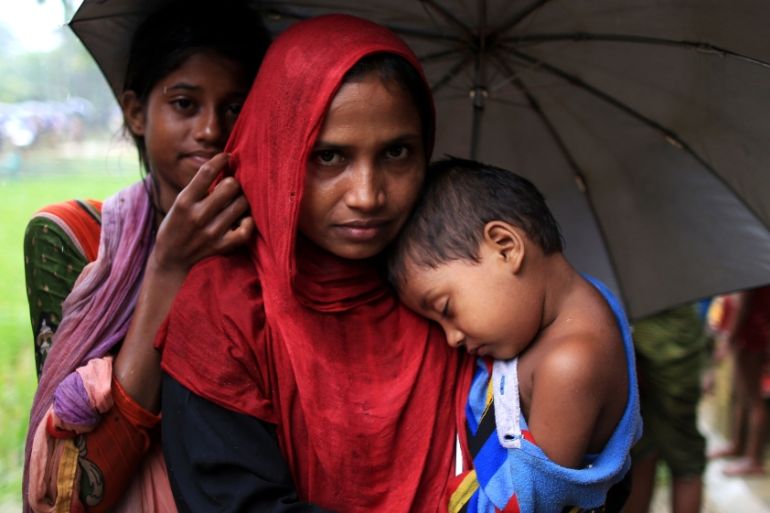Rohingya deportation: Supreme Court hears arguments
Top court asks the government and the Rohingya petitioners to present arguments on October 13 in the case.

India’s Supreme Court has heard arguments from the government and the two Rohingya, who have petitioned against the government’s plan to deport the persecuted refugees.
The apex court on Tuesday fixed October 13 as the next trial date and asked both the parties to desist from emotional arguments.
Keep reading
list of 4 itemsConflict, climate, corruption drive Southeast Asia people trafficking: UN
Bodies of three Rohingya found as Indonesia ends rescue for capsized boat
How is renewed violence in Myanmar affecting the Rohingya?
A bench headed by Chief Justice Dipak Misra asked both the parties to compile all documents and international conventions for assisting the court, according to the timesofindia.com.
Government lawyer Tushar Mehta told the court during the hearing that Rohingya refugees will cause wages to decrease, adding to its earlier arguments that the Rohingya were a security threat.
READ MORE: Rohingya in India fear deportation to Myanmar
Ravi Nair of the South Asia Human Rights Documentation Centre told Al Jazeera that the Modi government “suffers from Islamophobia and it sees in every Muslim a potential terrorist”.
“It is not following the main thrust of the fundamental rights chapter of the Indian constitution. Article 21 of the Indian constitution clearly says that right to life is available to both nationals and non-nationals,” he said.
Out of the estimated 40,000 Rohingya refugees, more than 16,000 are registered with the United Nations refugee agency, but the government has said that even those registered with UNHCR would not be spared from deportation.
The lawyer representing the Rohingya, Prashant Bhushan, has denounced the plan. “This is clearly a case of religious discrimination and an attempt to arouse an anti-Muslim feeling,” Bhushan said.
Modi’s government has been criticised by activists for not speaking out against Myanmar’s recent military offensive against the Rohingya, and right-wing groups in India have begun vilifying Rohingya living there.
The Rohingya are denied citizenship in Buddhist-majority Myanmar and regarded as illegal immigrants, despite claiming roots that date back centuries.
Arijit Sen, a researcher with Amnesty International, has termed the Modi government’s stand “a mix of paranoia and xenophobia”.
“It is an approach that welcomes Hindu refugees from India’s neighbouring countries, but shuts the door on Rohingya, who are predominantly Muslim, in the name of national security,” he wrote in an Al Jazeera article.
“But this move goes against India’s international legal obligations, and also its constitutional guarantees of human rights.”
OPINION: Is India contributing to the Rohingya catastrophe?
India’s opposition leader and former Foreign Minister Shashi Tharoor has criticised the government’s stand on the Rohingya.
“India has thousands of years old tradition of giving shelter to those seeking refuge, which it should not jettison,” Tharoor, the former UN undersecretary-general, was quoted as saying by the UNI news agency.
More than half a million Rohingya have fled their homes in Myanmar and taken shelter in squalid refugee camps in Bangladesh’s Cox’s Bazar district near the border since August 25.
Myanmar’s military launched what it called “clearing operations” against the Rohingya ethnic community after an army base came under deadly attack.
Hundreds of Rohingya have since been killed, women have been gang-raped and vast swaths of Rohingya villages have been burned down in apparent revenge attacks, backed by Buddhist mobs.
“I do not know what the government is thinking when it is talking of deportation,” Nair said.
“If refugees are sent back forcibly, they will certainly face torture and might face possible death. Clearly, this is a violation of the article 21. This is the main ground on which the Supreme Court will hear the petition.”